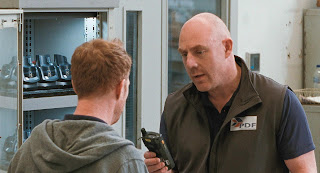Sorry We Missed You is Ken Loach's follow up to 2016's I, Daniel Blake and it mines a similar vein of problems with modern British society. In this case, it's the 'Zero-hours economy', whereby companies can keep workers on call or franchise (virtually 'non-employed' employees), leaving the way clear for mass exploitation. Not a new thing, sure, but the loosening of regulations to allow this kind of economic fascism shows just what kind of politics rule the roost these days.
Loach is a master at this genre, he's been doing this kind of film for years, and he's getting even more angry if these last two films are anything to go by. The focus of this film is the Turner family, specifically husband and father, Ricky, shaggily played by Kris Hitchens. He naively (or desperately) agrees to the terrible conditions set out by the foreman of a parcel delivery company, Maloney, played by Ross Brewster. This guy is a prime prick but Brewster imbues him with the threat of sympathy before pulling the rug out from under us. It would be veering into black comedy if it weren't so realistic. The performances are very natural - characters occasionally stumble over lines, some of the younger actors mumble a bit (now there's a tricky dialect to follow - 'Mumble Geordie'). Many of the cast are making debuts here, the standout for me being Katie Proctor, who plays Ricky's daughter, Liza.
Sorry is written by Paul Laverty, Loach's usual scribe, and he joins cinematographer Robbie Ryan and editor Jonathan Morris as Loach returnees. The story plays out as you'd expect, riddled with despair, alongside the odd bright moment and one or two simmerings coming to the boil (hats off to Debbie Honeywood for an NHS-set eruption). It's hard to know how to judge the ending - without giving anything away, it's maddeningly, seat-punchingly, foreseeable.With a loyal crew and a (reasonably) novice cast, it would seem that box office isn't an issue - no need for bottom line, hence Loach can basically make what he wants. But here's the rub - he's been making left-wing, workers' rights, solidarity films since the 1960s. Fat lot of fucking good he has done when you look at what's going on in the UK and the world in general. And yet, if he isn't making these, if he does retire, like he planned after Jimmy's Hall, then we'd most likely be even worse off.
So overall, a bleak way to spend a Saturday morning but bleak Loach is better than no Loach at all.
See also:
Riff-Raff (1991) is another little Loach gem, as is The Wind that Shakes the Barley (2006).
SPOILERS IN POD!!! (and apologies for slightly different sound quality...)
Listen to "Sorry We Missed You" on Spreaker.

















































